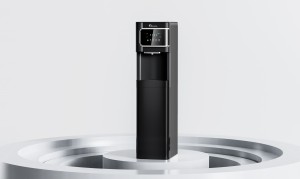Kev lim dej uas hloov pauv sai sai no tab tom npaj rau kev nce qib tshiab hauv lub neej yav tom ntej. Nrog rau kev txhawj xeeb txog qhov zoo ntawm dej thiab qhov xav tau kev daws teeb meem uas ruaj khov, kev tsim cov tshuab lim dej tshiab cog lus tias yuav muaj lub neej yav tom ntej zoo dua rau cov dej haus huv thiab muaj kev nyab xeeb.
Nyob rau xyoo tas los no, kev tsim kho tshiab ntawm thev naus laus zis tau hloov cov tshuab lim dej ib txwm mus ua cov khoom siv ntse thiab ua haujlwm tau zoo. Kev koom ua ke ntawm kev txawj ntse ntawm cov khoom siv (AI) thiab Internet of Things (IoT) thev naus laus zis tau tsim txoj hauv kev rau cov tshuab lim dej ntse uas tuaj yeem saib xyuas qhov zoo ntawm dej, tshuaj xyuas cov ntaub ntawv, thiab kho cov txheej txheem lim dej kom ua tau zoo tshaj plaws.
Ib qho ntawm cov kev vam meej tseem ceeb uas tsav lub neej yav tom ntej ntawm cov tshuab lim dej yog kev siv nanotechnology. Cov khoom siv nano, xws li graphene oxide thiab carbon nanotubes, muaj cov yam ntxwv tshwj xeeb uas ua rau muaj peev xwm lim dej zoo dua. Cov daim nyias nyias lim dej no tuaj yeem tshem tawm txawm tias cov khoom me me, xws li cov hlau hnyav, microplastics, thiab cov tshuaj seem, muab cov dej haus huv dua thiab noj qab haus huv dua.
Lwm qhov kev cia siab zoo siab yog kev siv cov txheej txheem lim dej uas zoo rau ib puag ncig thiab ruaj khov. Cov tshuab lim dej ib txwm muaj feem ntau tsim cov khib nyiab thaum lub sijhawm lim dej. Txawm li cas los xij, cov tshuab lim dej yav tom ntej tau tsim los nrog cov txheej txheem zoo rau ib puag ncig. Piv txwv li, qee cov qauv suav nrog cov khoom siv hluav taws xob rov ua dua tshiab, xws li cov vaj huam sib luag hnub ci lossis kev siv lub zog kinetic, los txhawb cov txheej txheem lim dej. Tsis tas li ntawd, cov txheej txheem lim dej siab heev, suav nrog kev rov qab osmosis thiab kev ua kom oxidation siab heev, tab tom raug tshawb nrhiav kom txo qis kev pov tseg dej thaum ua kom ntseeg tau tias muaj kev lim dej zoo tshaj plaws.
Kev nkag mus rau dej huv yog qhov teeb meem thoob ntiaj teb, tshwj xeeb tshaj yog nyob rau thaj chaw deb lossis thaum muaj kev puas tsuaj ntuj tsim. Txhawm rau daws qhov teeb meem no, cov tshuab lim dej me me thiab yooj yim nqa tau raug tsim los kom yooj yim siv rau hauv cov xwm txheej ceev. Cov khoom siv me me no, nruab nrog cov txheej txheem lim dej zoo, tuaj yeem lim dej sai sai los ntawm cov chaw muaj xws li cov dej ntws, pas dej, lossis txawm tias cov dej qias neeg, muab txoj sia rau cov neeg xav tau.
Yav tom ntej ntawm cov tshuab lim dej tsis yog tsuas yog txwv rau cov tsev neeg lossis cov xwm txheej ceev xwb, tab sis kuj nthuav dav mus rau cov tshuab lim dej loj. Cov nroog thiab cov lag luam tab tom nqis peev rau hauv cov chaw kho dej siab heev uas siv cov thev naus laus zis lim dej zoo tshaj plaws, uas muaj peev xwm tswj tau cov dej ntau thaum tswj hwm cov qauv kev lim dej zoo tshaj plaws. Cov tshuab loj no yuav ua lub luag haujlwm tseem ceeb hauv kev muab dej huv rau tag nrho cov zej zog thiab ua kom tau raws li cov kev xav tau ntawm kev lag luam.
Txawm hais tias yav tom ntej ntawm cov tshuab lim dej muaj peev xwm loj heev, nws yog ib qho tseem ceeb heev uas yuav tsum daws cov teeb meem xws li kev them taus thiab kev nkag tau yooj yim. Kev tshawb fawb thiab kev txhim kho txuas ntxiv, nrog rau kev koom tes thoob ntiaj teb, yog qhov tseem ceeb hauv kev tsav tsheb kom txo cov nqi thiab xyuas kom meej tias txhua tus muaj dej huv.
Thaum peb sawv ntawm lub sijhawm tshiab hauv kev siv tshuab lim dej, lub zeem muag ntawm lub ntiaj teb uas muaj dej haus huv thiab huv si tau yooj yim nkag mus tau. Cov kws tshawb fawb, cov kws ua haujlwm, thiab cov neeg tsim kho tshiab thoob plaws ntiaj teb tab tom ua haujlwm tsis muaj zog los thawb cov ciam teb ntawm qhov ua tau, tsim lub neej yav tom ntej uas cov tshuab lim dej tsis yog tsuas yog cov khoom siv xwb tab sis cov cuab yeej tseem ceeb hauv kev tiv thaiv kev noj qab haus huv thiab kev noj qab haus huv ntawm tib neeg.

Lub sijhawm tshaj tawm: Lub Kaum Ob Hlis-26-2023

